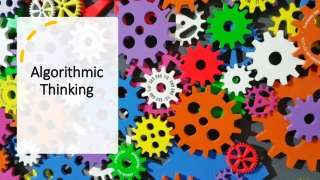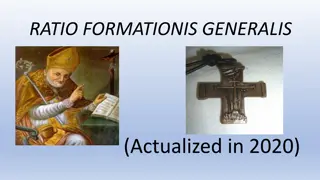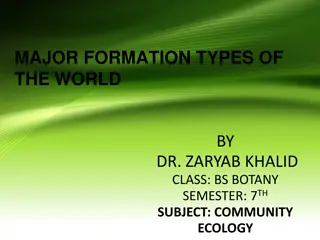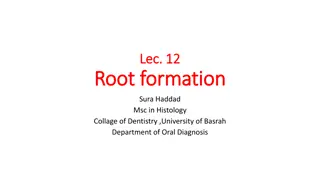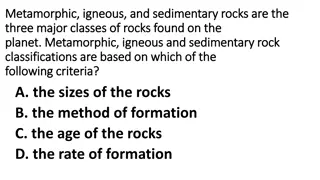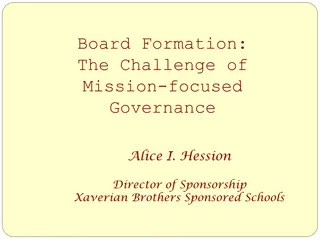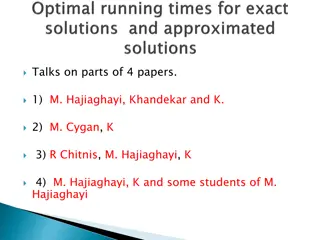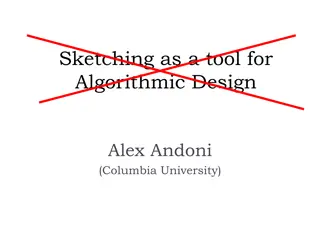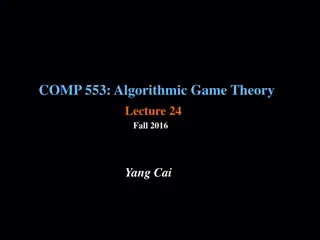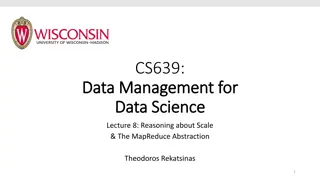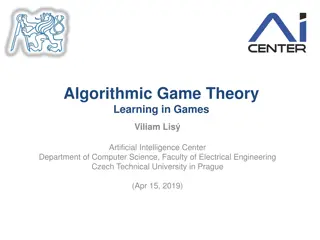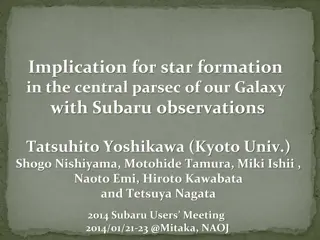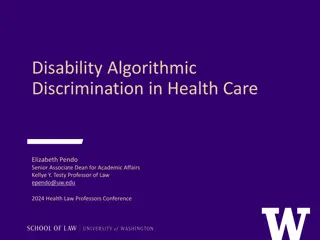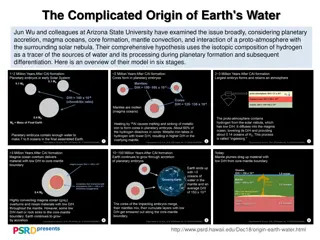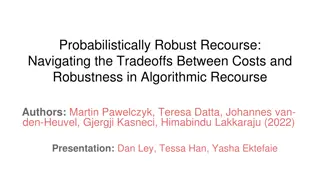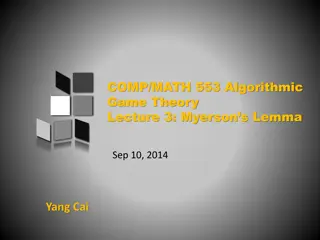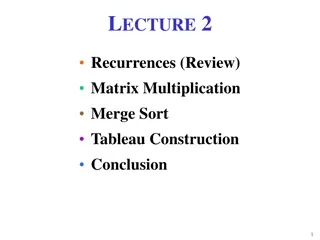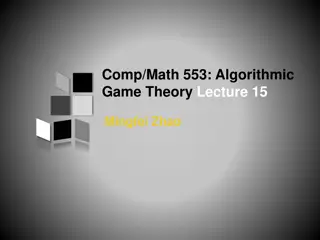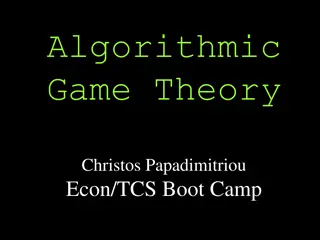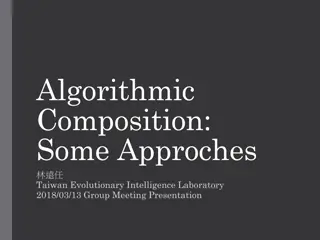Understanding Algorithmic Thinking: Key Concepts and Importance
Algorithmic thinking is a crucial skill that involves problem-solving through precisely defined instructions. This competency, applicable beyond computing, entails analyzing problems, identifying steps to solve them, and designing efficient algorithms. The importance of algorithmic thinking lies in
1 views • 13 slides
Deacon Formation Process in Diocese of Fort Worth Overview
This overview provides insights into the deacon formation and admissions process in the Diocese of Fort Worth. It emphasizes the importance of service, faith, and transformative journey in the formation process, along with stages such as initial inquiry, aspirant stage, candidate stage, ordination t
3 views • 27 slides
Evangelization and Faith Formation: Strengthening Catholic Men's Spiritual Journey
Explore the vital role of evangelization and faith formation in nurturing Catholic men's spirituality. Discover the essence of active relationship with God, ongoing formation in faith, life of prayer, and brotherhood. Learn about key elements like prayer, formation, and fraternity through initiative
1 views • 35 slides
Formation of Hertwig's Epithelial Root Sheath in Tooth Development
The formation of Hertwig's Epithelial Root Sheath (HERS) is crucial in determining the shape, length, and number of roots in teeth. It initiates the formation of radicular dentin, marking the beginning of root development after enamel and dentin formation. HERS consists of outer and inner enamel epi
0 views • 29 slides
HotFuzz: Discovering Algorithmic Denial-of-Service Vulnerabilities
A detailed exploration of algorithmic complexity bugs and insight into distributed micro-fuzzing methods. The study uncovers vulnerabilities through guided micro-fuzzing approaches, emphasizing the importance of AC bug detection and fuzz testing techniques such as seed inputs, fuzz observations, and
0 views • 14 slides
Evolution of the Ratio Formationis Generalis in Congregational Formation
Evolution and significance of the Ratio Formationis Generalis in Congregational Formation, from its historical development to the need for updates in response to changes in formation programs and Vatican documents. The formation of Units, Conferences, Directories, and Programs based on the Ratio, hi
4 views • 16 slides
Understanding Repair by Connective Tissue in Healing Processes
Healing or repair by connective tissue occurs in response to severe or chronic tissue injuries, leading to the replacement of nonregenerated cells with connective tissue or scar formation. This process involves the induction of fibroblast and endothelial cell proliferation, granulation tissue format
3 views • 26 slides
Major Formation Types of the World by Dr. Zaryab Khalid - BS Botany Semester 7
This presentation by Dr. Zaryab Khalid explores the major formation types of the world in the field of community ecology. It delves into the classification of natural and cultural vegetations, the concept of formation classes and subclasses, and details the six natural formation classes along with e
2 views • 7 slides
Root Development in Tooth Growth Process
Root formation plays a crucial role in the development of teeth, starting after enamel and dentin formation at the cementoenamel junction. Hertwig's epithelial root sheath (HERS) molds the shape of roots, initiating radicular dentin formation. The cervical loop forms an epithelial diaphragm, narrowi
0 views • 23 slides
Collaborative Teamwork Guide for Effective Ways of Working
Utilize the Team Ways of Working guide to enhance collaboration, inclusivity, and effectiveness within your team, whether working in-person or remotely. Develop a team plan together, led by the team leader or manager, to ensure equal participation and drive team belonging. Consider virtual ways of w
2 views • 6 slides
Understanding the Right to an Explanation in GDPR and AI Decision Making
The paper delves into the necessity for Explainable AI driven by regulations such as the GDPR, which mandates explanations for algorithmic decisions. It discusses the debate surrounding the existence of a legally binding right to explanation and the complexities of accommodating algorithmic machines
0 views • 22 slides
Evolution of Algorithms and Computer Science Through History
The history of algorithms and algorithmic thinking dates back to ancient times, with the development of general-purpose computational machines by Charles Babbage in the 19th century marking a significant advancement. The term "computer science" emerged in 1959, encompassing theoretical computer scie
1 views • 39 slides
Computational Thinking, Algorithms & Programming Overview
This unit covers key concepts in computational thinking, including decomposition, abstraction, and algorithmic thinking. Decomposition involves breaking down complex problems, abstraction focuses on identifying essential elements, and algorithmic thinking is about defining clear instructions to solv
1 views • 5 slides
Understanding Algorithmic Thinking in Digital Systems
Explore the application of algorithmic thinking in digital systems through the journey of Mike Clapper, the Executive Director of AMT. Learn about recognizing patterns in data, creating algorithms to solve problems, and utilizing information systems creatively. Enhance your knowledge of digital syst
0 views • 56 slides
Understanding Rocks: Types, Formation, and Properties
Rocks can be classified as metamorphic, igneous, or sedimentary based on their formation processes. Florida's phosphate deposits and pumice formation showcase the diversity of rocks. A scientist's rock cycle model helps predict changes, while pressure on sediments leads to new rock formation. Basalt
1 views • 22 slides
Challenges and Perspectives in Catholic Board Formation
Exploring the essential aspects of board formation in Catholic educational institutions, this content delves into models of formation, institutional needs, perspectives on faith formation, questions for reflection, governance from a mission perspective, and the significance of undertaking board form
1 views • 24 slides
Insights into Advanced Algorithmic Problems
Delve into discussions surrounding complex algorithmic challenges, such as the limitations in solving the 3-SAT problem within specific time bounds, the Exponential Time Hypothesis, proving lower bounds for algorithms in various scenarios, and exploring approximation ratios in algorithm design. Thes
1 views • 65 slides
Sketching as a Tool for Algorithmic Design by Alex Andoni - Overview
Utilizing sketching in algorithmic design, Alex Andoni from Columbia University explores methodologies such as succinct efficient algorithms, dimension reduction, sampling, metric embeddings, and more. The approach involves numerical linear algebra, similarity search, and geometric min-cost matching
0 views • 18 slides
Effective Team Formation in Public Health Incident Leadership
Explore the key aspects of team formation in public health incidents such as setting the tone, orienting the team, and establishing expectations. Learn how high-reliability teams operate and the importance of leadership in ensuring team reliability and efficiency. Understand the roles within an Inci
0 views • 19 slides
Evolution of Compact Star-Forming Galaxies and Quiescent Galaxies
The evolution of galaxies from compact star-forming to quiescent states involves processes such as secular evolution, gas inflows, and star formation quenching. By studying the structural relations and star formation in these galaxies, insights are gained into their transition towards quiescence. Th
0 views • 12 slides
Tactical Formation Maneuvering for T-44C Aircraft
This presentation provides essential knowledge for conducting tactical formation flights in the T-44C aircraft, covering formation types, fundamentals, maneuvers, and division formations. It outlines the importance of formation unity, maneuverability, and coordination, along with considerations like
0 views • 41 slides
Algorithmic Issues in Tracking: A Deep Dive into Mean Shift, EM, and Line Fitting
Delve into algorithmic challenges in tracking tasks, exploring techniques like mean shift, Expectation-Maximization (EM), and line fitting. Understand the complexities of differentiating outliers and inliers, with a focus on segregating points into best-fit line segments.
0 views • 44 slides
Understanding Greedy Algorithms in Algorithmic Design
Greedy algorithms in algorithmic design involve making the best choice at each step to tackle large, complex problems by breaking them into smaller sub-problems. While they provide efficient solutions for some problems, they may not always work, especially in scenarios like navigating one-way street
1 views • 9 slides
Enhancing Algorithmic Team Formation Through Stakeholder Engagement
Integrating stakeholder voices is crucial in algorithmic team formation to ensure a positive team experience, quality outcomes, and high performance. This research explores learner-centered approaches and considers various team formation methods, highlighting their strengths and weaknesses in educat
0 views • 37 slides
Understanding Brouwer's Fixed Point Theorem and Nash's Proof in Algorithmic Game Theory
Explore the foundational theorems of Brouwer and Nash in Algorithmic Game Theory. Dive into Brouwer's Fixed Point Theorem, showcasing the existence of fixed points in continuous functions. Delve into Nash's Proof, unveiling the Nash equilibrium in game theory. Discover visualizations and constructio
0 views • 23 slides
Understanding Scalability and Algorithmic Complexity in Data Management for Data Science
This lecture delves into the concept of scalability in data management for data science, covering operational and algorithmic aspects. It discusses the importance of efficient resource utilization, scaling out to multiple computing nodes, and managing algorithmic complexity for optimal performance i
0 views • 47 slides
Proposal for Directive to Enhance Working Conditions in Platform Work
The proposal aims to address challenges in platform work, including employment status classification and algorithmic management issues. It seeks to improve transparency, fairness, and accountability in algorithmic decision-making, correctly determine employment status, enhance transparency in platfo
0 views • 13 slides
Understanding Debugging in High-Level Languages
Debugging in high-level languages involves examining and setting values in memory, executing portions of the program, and stopping execution as needed. Different types of errors – syntactic, semantic, and algorithmic – require specific debugging approaches. Syntactic errors are related to code l
0 views • 9 slides
Algorithmic Game Theory Learning in Games by Viliam Lis
The content discusses the concept of algorithmic game theory learning in games, covering topics such as online learning, prediction, best response dynamics, and convergence to Nash equilibrium. It explores how simple learning agents achieve equilibrium outcomes and the application of algorithms in v
0 views • 23 slides
Implications of Star Formation in the Central Parsec of Our Galaxy with Subaru Observations
Researchers presented implications of star formation in the central parsec of our Galaxy using Subaru observations at the 2014 Subaru Users Meeting. The study focused on the supermassive black hole Sgr A* and the challenges posed by conditions in the Galactic Center for star formation. Various scena
0 views • 30 slides
Algorithmic Discrimination in Health Care: Protecting Vulnerable Patients
Elizabeth Pendo and Jennifer D. Oliva discuss disability discrimination in health care algorithms, advocating for legal protections under Section 504, ADA, and ACA. Their article proposes strategies to combat algorithmic bias and enhance antidiscrimination efforts in the 2024 Section 1557 final rule
0 views • 13 slides
The Complicated Formation of Earth's Water: A Detailed Overview
Jun Wu and colleagues at Arizona State University have developed a comprehensive model to explain the origin of Earth's water through stages such as planetary accretion, core formation, and interactions with the solar nebula. By tracing the isotopic composition of hydrogen, they explore how water so
0 views • 7 slides
Navigating Tradeoffs in Algorithmic Recourse: A Probabilistic Approach
This paper introduces PROBE, a Probabilistically Robust Recourse framework allowing users to balance cost and robustness in algorithmic recourse. Users can choose the recourse invalidation rate, enabling more tailored and efficient recourse management compared to existing methods. PROBE enhances cos
0 views • 17 slides
Understanding Myerson's Lemma in Algorithmic Game Theory
Myerson's Lemma is a fundamental concept in algorithmic game theory, particularly in the context of Sponsored Search Auctions. This lecture delves into the application of Myerson's Lemma to ensure truthful bidding as a dominant strategy, maximize social welfare, and maintain polynomial running time
0 views • 19 slides
Understanding Algorithmic Complexity Measures and the Master Method
In this study, we explore key concepts in algorithmic complexity, including recurrences, matrix multiplication, merge sort, and tableau construction. We delve into the Master Method for solving recurrences, examining Cases 1, 2, and 3, and providing solutions for each scenario. Additionally, we disc
0 views • 61 slides
Algorithmic Game Theory Lecture on Prophet Inequality and Auction Design
In this lecture on Algorithmic Game Theory, Mingfei Zhao discusses the Prophet Inequality and its application to single-item auctions. The lecture covers the concept of Prophet Inequality, strategies to guarantee expected payoffs, and different auction designs such as the Bulow-Klemperer Theorem and
0 views • 10 slides
Evolution of Algorithmic Game Theory in Computer Science
The evolution of Algorithmic Game Theory (AGT) in the realm of Computer Science showcases the intersection of economics and theoretical computation. Before 1995, notable researchers like von Neumann and Megiddo laid the foundation for AGT. Concepts such as computation as a game, bounded rationality,
0 views • 62 slides
Team Name Team - Meet the Dynamic Members
Discover the talented individuals who make up the Team Name Team, including the Team Manager, Senior Team members, ST Team Captain, and Student Team members. Get insights into their roles and expertise through captivating images showcasing their dedication and teamwork.
0 views • 13 slides
Exploring Algorithmic Composition Techniques in Music Generation
Algorithmic composition involves the use of algorithms to create music, mimicking human composers by generating music based on specific rules and structures. This presentation delves into various approaches such as DeepBach, MuseGAN, and EMI, highlighting the use of evolutionary algorithms, machine
0 views • 35 slides
Understanding Standard Molar Enthalpies of Formation
Formation reactions involve substances being created from elements in their standard states, with the enthalpy change known as the standard molar enthalpy of formation (Hf). This enthalpy represents the energy released or absorbed when one mole of a compound is formed from its elements in their stan
0 views • 13 slides
